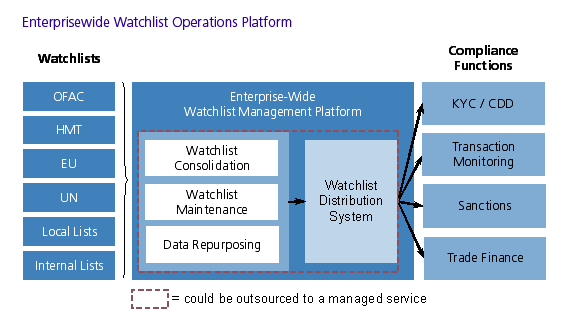Achieving Global Sanctions Compliance: Challenges and Solutions
Abstract
A study by Celent and sponsored by Dow Jones Risk & Compliance looks at the challenges and best practices in managing customer and transaction screening processes—“watchlist filtering”—at large financial institutions.
In a new report, Achieving Global Sanctions Compliance: Challenges and Solutions, Celent examines issues related to achieving efficiency and consistency across the complex, distributed compliance operations of major global banks. The report focuses particularly on sanctions compliance, which is the area of anti-money laundering (AML) that is most dependent on watchlist data.
This close reliance on the data means that effective sanctions compliance relies on clean, well-managed, and optimized watchlist data. But as the industry well knows, watchlist data presents myriad challenges in terms of data quality, complexity, and maintenance.

The report is based on Celent’s own observations of the state of sanctions compliance, as well as conversations with some 15 large banks in North America, Europe and Asia. Findings of the report include:
- The cost of maintaining sanctions compliance is only escalating. Active regulators in the US, EU and UK require banks to adhere to the latest developments in technology and operations, sending new spending into the millions annually.
- To keep costs in check and improve efficacy, large banks are organizing centralized operations and technology platforms that perform sanctions compliance across multiple business lines of the bank.
- Some banks feel they have watchlist management under control, while others see it as a burden incurring significant cost, effort and specialized expertise.
“Achieving consistency in global sanctions compliance involves standardizing operations, technology systems, and perhaps most essentially the compliance data—watchlists—that drive sanctions filtering,” says Neil Katkov, PhD, Senior Vice President, Asia for Celent and author of the report. “The challenge is how to keep up with the pace of regulation, and on a global scale.”
The report also considers the effect of the Arab Spring on sanctions activity by regulators, and the special challenges for watchlist filtering and sanctions compliance posed by non-Latin scripts such as Arabic, Cyrillic, Chinese, and Japanese.

